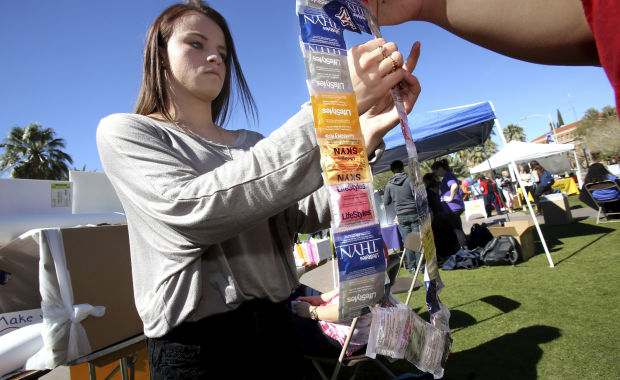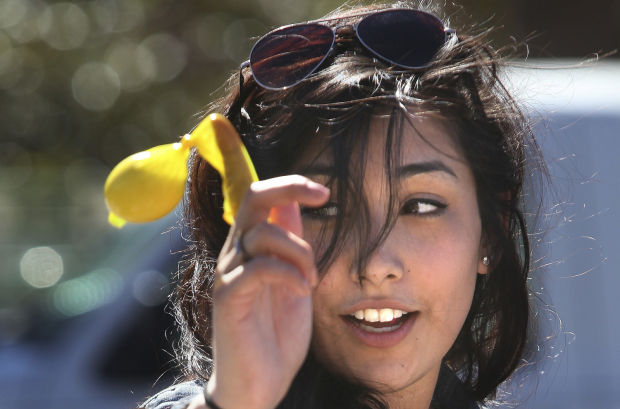College students may think they know about sex, but the reality is that many of them have a lot to learn.
There are 210 students enrolled in the University of Arizona’s Sex, Health and AIDS class this semester — a full roster. The class provides information many of them have never been taught, and in turn they are educating others on campus.
“I asked for a show of hands on the first day of class,” said William Simmons, associate professor of gender and women’s studies. “About 70 percent of my students had received education on abstinence only.”
Freshman Daniela Rodriguez, 19, was offered no sex education prior to arriving at the UA.
“In my high school, it was, ‘Don’t mention it,’” Rodriguez said. “And sex wasn’t something I talked about with my parents.”
Rodriguez, an early education major, grew up in Nogales, where teen pregnancy was common.
“Sex education wasn’t offered as an elective at my school,” she said. “Only early childhood development. There should be a class on sex education.”
Arizona schools aren’t required to teach the subject, and if it’s offered, parental consent is required for students to take the class.
Rodriguez enrolled in Simmons’ course to fulfill a general-education requirement, but also because she wanted more information about HIV and sexually transmitted diseases.
“Up until now, all I knew was that HIV was a virus,” Rodriguez said. “This information is all new to me.”
Initially, Rodriguez’s mother was unsure about her daughter taking the class, but then conceded she would rather have her daughter learn about sex and STDs in that forum than somewhere else.
This is Simmons’ first time teaching the class. He avoids lectures and is requiring his students to take only one exam. The teaching is all interactive, and action- and problem-based.
One course requirement dictated that students organize and participate in last week’s Condom Olympics as part of UA’s Sex Talk Week 2014.
Each student signed up for a different committee within the event, but Simmons gave them another option if they chose not to take part.
“If students agreed to get tested at the Pima County Health Department’s testing truck, they didn’t have to participate in a committee,” Simmons said. “I had at least 10 students choose to do that, and those are people who might not otherwise get tested.”
Simmons said he considers that a “win.”
Although Sex Talk Week is an annual thing, in the four years that health educator Carrie Hardesty has been working for Campus Health, this is the first time students have organized any of the events.
With temps in the mid-70s on Wednesday, the UA Mall was crowded with students visiting the dozen tables dedicated to the event.
A 6-foot-tall “Mr. Condom” was on hand for students to take photos with, and a condom scavenger hunt, condom art and condom relay races were among the activities planned by the students in Simmons’ class.
Elizabeth Verklan is one of Simmons’ teaching assistants this semester, and leads two discussion sections.
“They don’t necessarily perceive this as work,” she said. “They’re thinking about the topic and how it affects their life.”
Verklan said her students ask questions and talk about sexual habits, among other related topics. She’s been told that it’s a setting in which students feel comfortable to talk freely.
“There are so many ways to make this information relevant to them,” Verklan said. “And it doesn’t feel awkward.”
Noel Valle, family planning case manager for the county health department, worked at the truck that performed free, on-site HIV and STD testing at the event.
“It’s been very busy,” she said. “I’m not sure how many students, but it’s been a bunch.”
Simmons’ students manned a table with stacks of brochures about sexual health.
Briana Booker, 19, was excited to be a part of the event, as well as what she’s learning in class.
Booker, a wildlife conservation major, attended junior high and high school in the Flowing Wells school district. Although she took sex education, many of her friends had parents who wouldn’t let them.
“I can understand if their parents were open to talking about sex,” she said, “but mine weren’t.”
Booker also said the sex education she received in high school stressed abstinence, compared to the more comprehensive STD information she studied in junior high. HIV and AIDS were not stressed, she said, and most of what she’s now learning is new to her.
Pima Community College sophomore Jose Duran also attended to help out. As one of Booker’s friends, Duran was strictly there out of personal interest.
He said that, though he took sex ed in high school, he’s also learned quite a bit that is fresh information for him. Duran also expressed concern about other young people’s health.
“If people don’t want to talk about sex in school, that’s OK,” he said. “At some point they need to say, ‘I need to learn about these things or there will come a day when I’m sick and don’t know what to do.’ ”






